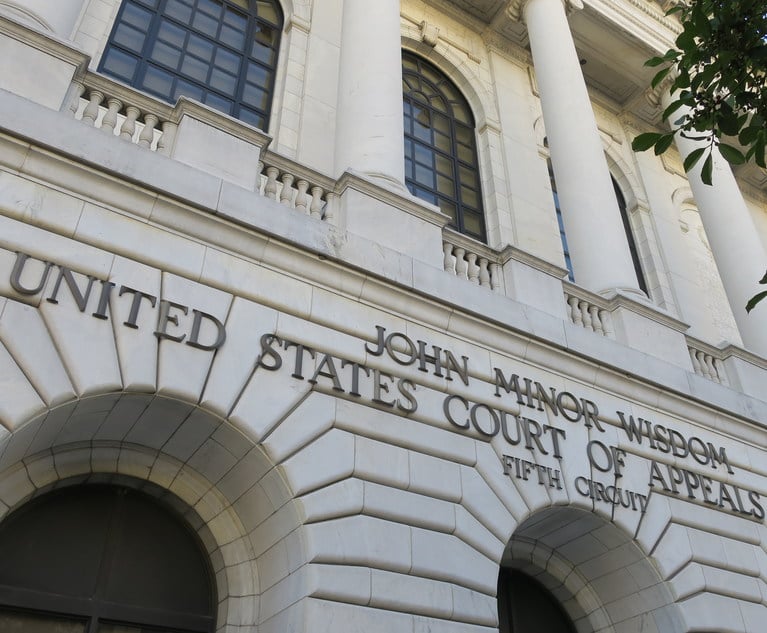EEOC Fights Ninth Circuit Ruling That 'Institutionalizes' Gender Pay Gap
The U.S. Equal Employment Opportunity Commission said a recent federal appeals court decision "institutionalizes" the gender pay gap by allowing employers to pay women less than men based on previous salaries.
May 24, 2017 at 12:45 AM
5 minute read
The U.S. Equal Employment Opportunity Commission said a recent federal appeals court decision “institutionalizes” the gender pay gap by allowing employers to pay women less than men based on previous salaries.
A three-judge panel of the U.S. Court of Appeals for the Ninth Circuit said pay discrepancies based exclusively on previous salaries are not discriminatory under the federal Equal Pay Act, which forbids employers from paying women less than men for equal work performed under similar working conditions. The court said an employer could base a salary on previous pay if it shows its use was “reasonable and effectuated a business policy.”
This week, the EEOC called for the Ninth Circuit to reconsider the case as a full court.
The agency noted a split among earlier appeals court rulings and said there would be wide and harmful effects in closing the gender pay gap in the United States, where research shows women make 80 cents on the dollar compared to male counterparts.
“If, as the panel holds, employers may base starting pay on what employees earn in their previous jobs, women on average will continue to earn less than men for substantially equal work,” the EEOC argued, thus rather than eliminating an existing gap, perpetuating it.
The Ninth Circuit ruling risks perpetuating gender discrimination, said Tracy Thomas, professor at the University of Akron School of Law, who edits the Gender and the Law Prof Blog.
“I thought in equality law we had moved beyond that,” Thomas said. “Why does she have a different salary history? She has a different salary history because of a gendered system. They say you can rely on salary history, which ignores the structural part of discrimination. That's a big concern.”

Diego M. Radzinschi/ ALM
The court push from the EEOC could also signal that the agency—known in the last decade for promoting systemic change—may continue on that path even under the Trump administration, which suggested through agency appointments an ideological shift toward business-friendly policies.
The EEOC's action in the Ninth Circuit is evidence that the agency is continuing to push a pro-enforcement position in the absence of any direction to shift priorities, said David Lopez, former general counsel to EEOC in the Obama administration who's now a partner at Outten & Golden in Washington.
Anti-discrimination laws tend to be a nonpartisan issue, Lopez said, but time will tell whether the Trump administration's appointments and senior hires will affect the agency. “That decision was surprising and shocking to folks who have been really pressing the eradication of the pay gap,” Lopez said. “It's been such a persistent issue.”
In 2012, Aileen Rizo, who worked for a Fresno County, California, public school, brought a lawsuit against her employer after she discovered her male co-workers were making higher salaries despite comparable or equal experience.
The county's standard policy for hiring added 5 percent to previous pay and then bumped her up to the minimum for her position at $63,000. Male colleagues with similar experience made as much as $10,000 or more than she earned, according to her complaint.
The Equal Pay Act creates exceptions when pay is based on seniority, merit, quantity or quality of work or “any other factor other than sex.”
The EEOC said in its filing to the appeals court that Fresno County's practice undermines the purpose of the Equal Pay Act because it “institutionalizes” the gender pay gap. The commission said prior salary alone cannot be considered an exception.
“The county argued that it does not discriminate on the basis of sex; its practice is gender neutral,” EEOC attorney Barbara Sloan wrote in the commission's brief. “But to the extent that one employer discriminated in pay against a female employee, the next employer—even one like the county whose practice is simply to carry forward any existing pay discrepancies—would benefit from the prior discrimination to the detriment of that employee by paying her less than male employees not similarly subject to prior discrimination.”
Two federal appeals courts—the Tenth and Eleventh circuits—previously held that prior pay alone cannot be considered as an exemption to equal pay laws. “They reason that 'if prior salary alone were a justification, the exception would swallow up the rule and inequality in pay among genders would be perpetuated,'” Sloan wrote. The Seventh Circuit has ruled that previous salary could be considered.
Thomas of the University of Akron said paying women lower salaries is systemic in the employment market. When women first began working as teachers in the early 19th century, salaries dropped 75 percent once women began replacing men. That trend continued in the Industrial Age when employers paid a new wave of women workers less because it was assumed their jobs were their secondary responsibility to raising a family.
She also noted a slew of state and local laws passed in recent years and months that move in the opposite direction of the Ninth Circuit's decision. States, for instance, are passing laws that prohibit employers from asking a job candidate for his or her previous salary during job negotiations.
Copyright the National Law Journal. All rights reserved. This material may not be published, broadcast, rewritten, or redistributed.
This content has been archived. It is available through our partners, LexisNexis® and Bloomberg Law.
To view this content, please continue to their sites.
Not a Lexis Subscriber?
Subscribe Now
Not a Bloomberg Law Subscriber?
Subscribe Now
NOT FOR REPRINT
© 2025 ALM Global, LLC, All Rights Reserved. Request academic re-use from www.copyright.com. All other uses, submit a request to [email protected]. For more information visit Asset & Logo Licensing.
You Might Like
View All
Legal Issues to Watch in the US Appeals Courts in 2025

Second Circuit Upholds $5M Judgment Against Trump in E. Jean Carroll Case
4 minute read
Divided 5th Circuit Shoots Down Nasdaq Diversity Rules

Nevada Supreme Court to Decide Fate of Groundbreaking Contingency Cap Ballot Measure
5 minute readTrending Stories
- 1Restoring Trust in the Courts Starts in New York
- 2'Pull Back the Curtain': Ex-NFL Players Seek Discovery in Lawsuit Over League's Disability Plan
- 3Tensions Run High at Final Hearing Before Manhattan Congestion Pricing Takes Effect
- 4Improper Removal to Fed. Court Leads to $100K Bill for Blue Cross Blue Shield
- 5Michael Halpern, Beloved Key West Attorney, Dies at 72
Who Got The Work
Michael G. Bongiorno, Andrew Scott Dulberg and Elizabeth E. Driscoll from Wilmer Cutler Pickering Hale and Dorr have stepped in to represent Symbotic Inc., an A.I.-enabled technology platform that focuses on increasing supply chain efficiency, and other defendants in a pending shareholder derivative lawsuit. The case, filed Oct. 2 in Massachusetts District Court by the Brown Law Firm on behalf of Stephen Austen, accuses certain officers and directors of misleading investors in regard to Symbotic's potential for margin growth by failing to disclose that the company was not equipped to timely deploy its systems or manage expenses through project delays. The case, assigned to U.S. District Judge Nathaniel M. Gorton, is 1:24-cv-12522, Austen v. Cohen et al.
Who Got The Work
Edmund Polubinski and Marie Killmond of Davis Polk & Wardwell have entered appearances for data platform software development company MongoDB and other defendants in a pending shareholder derivative lawsuit. The action, filed Oct. 7 in New York Southern District Court by the Brown Law Firm, accuses the company's directors and/or officers of falsely expressing confidence in the company’s restructuring of its sales incentive plan and downplaying the severity of decreases in its upfront commitments. The case is 1:24-cv-07594, Roy v. Ittycheria et al.
Who Got The Work
Amy O. Bruchs and Kurt F. Ellison of Michael Best & Friedrich have entered appearances for Epic Systems Corp. in a pending employment discrimination lawsuit. The suit was filed Sept. 7 in Wisconsin Western District Court by Levine Eisberner LLC and Siri & Glimstad on behalf of a project manager who claims that he was wrongfully terminated after applying for a religious exemption to the defendant's COVID-19 vaccine mandate. The case, assigned to U.S. Magistrate Judge Anita Marie Boor, is 3:24-cv-00630, Secker, Nathan v. Epic Systems Corporation.
Who Got The Work
David X. Sullivan, Thomas J. Finn and Gregory A. Hall from McCarter & English have entered appearances for Sunrun Installation Services in a pending civil rights lawsuit. The complaint was filed Sept. 4 in Connecticut District Court by attorney Robert M. Berke on behalf of former employee George Edward Steins, who was arrested and charged with employing an unregistered home improvement salesperson. The complaint alleges that had Sunrun informed the Connecticut Department of Consumer Protection that the plaintiff's employment had ended in 2017 and that he no longer held Sunrun's home improvement contractor license, he would not have been hit with charges, which were dismissed in May 2024. The case, assigned to U.S. District Judge Jeffrey A. Meyer, is 3:24-cv-01423, Steins v. Sunrun, Inc. et al.
Who Got The Work
Greenberg Traurig shareholder Joshua L. Raskin has entered an appearance for boohoo.com UK Ltd. in a pending patent infringement lawsuit. The suit, filed Sept. 3 in Texas Eastern District Court by Rozier Hardt McDonough on behalf of Alto Dynamics, asserts five patents related to an online shopping platform. The case, assigned to U.S. District Judge Rodney Gilstrap, is 2:24-cv-00719, Alto Dynamics, LLC v. boohoo.com UK Limited.
Featured Firms
Law Offices of Gary Martin Hays & Associates, P.C.
(470) 294-1674
Law Offices of Mark E. Salomone
(857) 444-6468
Smith & Hassler
(713) 739-1250










